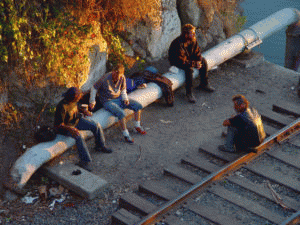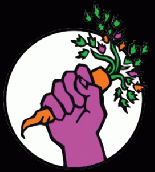From Consortium News

Homeless folks gather at sunset. Santa Cruz, CA. 2007.
(Image by (Flickr Franco Folini)) Details DMCA
Activist and author Keith McHenry, who co-founded Food Not Bombs in Boston in 1980, says cities across the U.S. have begun to take various steps to "criminalize" the homeless and those who try to help them.
I spoke to McHenry, author of Hungry for Peace: How You Can Help End Poverty and War with Food Not Bombs, in the seaside city of Santa Cruz, California, where he says there is an ongoing crackdown against Food Not Bombs workers as well as those who they are trying to feed.
"The most common government response to the suffering of those being forced into homelessness is for local authorities to make laws against being homeless," said McHenry. "Laws against sleeping, sitting, asking for money or what officials call 'Quality of Life Crimes,' living outside and lower[ing] the quality of life of those fortunate enough to not yet be forced out into the streets.
"Another [tactic] is to pass laws seeking to end the sharing of meals to the hungry in public ... hoping that by hiding the 'problem' of seeing so many of our neighbors living [on the streets], it will go away. Over 70 cities have passed laws regulating or banning the sharing of free food with the homeless outside."
According to a recent report from the Federation of Protestant Welfare Agencies, 21.8 percent of the nation's children and 15 percent of the population overall are poor and often hungry. Despite the growing needs of the homeless, the Federal government continues to cut vital services and assistance meant to help the most at-risk among us, said Jennifer Jones, Executive Director of the Federation of Protestant Welfare Agencies (FPWA), including "funding cuts for meals for home-bound seniors, vocational training programs for those who've lost their jobs, food for low income families, and the list goes on. At a time when our nation needs to protect people from continued and increasing hardship, and support economic growth, the Federal government has imposed sequestration cuts and proposes further budget cuts that take us backwards."
According to the National Center on Family Homelessness, using the most recent data from the U.S. Department of Education and the 2013 U.S. Census, at least "2.5 million children in America -- one in every 30 children -- go to sleep without a home of their own each year."
I spoke to Keith McHenry in Santa Cruz on Feb. 23 about the continuing attacks on those who have devoted themselves to distributing free food to the poor, homeless and hungry.
Dennis Bernstein: Please talk a little bit in general about what you do in terms of trying to give out food. And a bit about how the need for food has increased in recent years.
Keith McHenry: Recently, I've been involved in this project called the Freedom Sleepers, with the right for people to sleep in Santa Cruz. And it's illegal now to sleep here between the hours of 11 at night and 8:30 in the morning, outside, in a vehicle, or in the streets, or anywhere in the parks.
And the number of people that you see coming to our meals, it's just always getting larger and larger. And downtown Santa Cruz, like many ... downtowns -- L.A., I was just down there -- it's incredible the amount of people living on America's streets.
There's a study that just was reported in the Washington Post... and several articles about homeless children. There's estimated to be, using the federal government's own statistics, 2.5 million homeless children in America.

The Food Not Bombs logo, designed by Keith McHenry. According to FNB, 'The leaves of the carrot were drawn to represent the torch of liberty and the fist idea was a symbol borrowed from the left idea of united we are strong as in the logo of Students for
(Image by Food Not Bombs) Details DMCA
DB: ...2.5 million homeless children.
KM: It's just astounding. It's heartbreaking. To me, it's starting to have that sense of [Charles] Dickens, or the Great Depression, or something like that.
(Note: You can view every article as one long page if you sign up as an Advocate Member, or higher).





